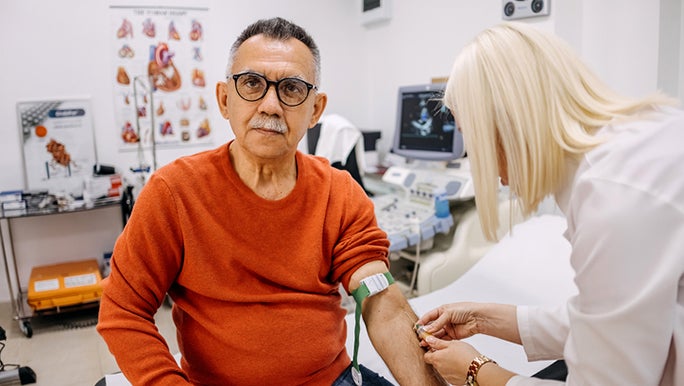Key Points
- There’s a lot of talk in alternative health circles about adrenal fatigue
- Evidence suggests the term adrenal fatigue isn’t scientifically accurate
- It’s important to seek out the underlying cause of your fatigue from a trusted health professional
A quick Google search will bring up millions of references to adrenal fatigue, a condition that may spring to mind if you have low energy, brain fog, body aches or sleep disturbances.
However, adrenal fatigue is not recognised as an official medical condition.
So, what’s the reason for the disconnect here? Why are so many health practitioners working to help their patients with a condition that science says doesn’t exist?
We speak to Naturopath Gabbie Watt to debunk the myths.
What do people mean by ‘adrenal fatigue’?
Gabbie says that while adrenal fatigue is a popular term that is used within the community, the terminology should be revised because it’s not scientifically accurate.
“Fatigue is a sign that there’s something else going on inside the body,” she says, “but it may not be specifically coming from your adrenal glands.”
But before we get into the myth debunking, what is ‘adrenal fatigue’?
The term was coined by a chiropractor in 1998 and has since been used by some alternative health practitioners.
The symptoms of what people think of as ‘adrenal fatigue’ include:
- fatigue
- low mood
- body aches
- nervousness
- low blood pressure
- sleep disturbances
- digestive issues
- cravings for sugar and salt
The theory is that too much stress causes the adrenal glands to become fatigued and unable to produce enough of their hormones, resulting in the above symptoms.
Although the symptoms of ‘adrenal fatigue’ in females and males are common for many people, the theory of adrenal fatigue is not yet proven and not scientifically accurate. (We’ll get into that in a moment.)

The adrenal glands release hormones like cortisol when we are stressed
The facts about the term ‘adrenal fatigue’
Are you ready for a quick ‘adrenal fatigue’ 101? Here are the facts:
- The adrenal glands sit on top of the kidneys and communicate with a part of the brain using the hypothalamic-pituitary-adrenal (HPA) axis. Their job is to release stress hormones like cortisol, among others.
- ‘Adrenal fatigue’ is thought to result from excessive and chronic stress placed on the body. A burnout of sorts.
- There are no formal diagnostic tests or criteria for ‘adrenal fatigue'.
- There is a serious medical condition called adrenal insufficiency, which is rare and autoimmune in nature. It’s important to make the distinction that ‘adrenal fatigue’ and adrenal insufficiency are not the same.
“The HPA axis is a negative feedback loop, meaning that if there are too many stress hormones produced, the adrenal glands and brain will talk and reduce the amount that are being produced,” Gabbie explains.
“And then if the body decides there aren’t enough stress hormones, it’ll release more.”

You can have a blood test to check your cortisol levels, but the time of day you have the test will affect the outcome
Where did the theory come from?
In the 1930s, Hungarian endocrinologist Hans Selye developed a theory of the ‘general adaptation syndrome,’ or GAS, which describes how the body responds to stress.
He identified 3 phases of stress:
- the alarm reaction
- the stage of resistance
- the stage of exhaustion
Somewhere along the line emerged the idea that the ‘exhaustion stage’ was characterised by the adrenal glands becoming so tired of producing cortisol, they would eventually stop producing it altogether.
Hans’ work was revolutionary for the time, but we know now that this theory wasn’t scientifically or biologically accurate. Today, you can jump online and find adrenal fatigue diet plans, elixirs, and vitamins for tiredness and lack of energy that are targeted towards this condition.
And since there’s no evidence to suggest that your adrenals get fatigued, Gabbie says there’s no accurate adrenal fatigue test.
“You can have your cortisol tested, but your cortisol levels fluctuate throughout the day,” she says. “So it just depends on the time of day you get it and the type of test performed.
“If you are constantly stressed, that may be pushing up your cortisol levels throughout the day, and that may not be healthy in the long term.”
If you believe your cortisol levels have been high for a prolonged period of time, it’s best to talk to your health professional about what’s going on, rather than assume you have adrenal fatigue.

If you’re experiencing ongoing fatigue, it’s important to visit your GP for a check-up
When to see your GP
From a medical perspective, we know that too much stress isn’t healthy for our bodies. It can come with an array of symptoms, such as:
- changes in sleep patterns
- muscle aches
- withdrawal from loved ones
- exhaustion
- difficulty concentrating
If these issues sound familiar and you’ve been told you may have adrenal fatigue, Gabbie recommends visiting your GP or health professional for further investigation.
“I would encourage you to seek out a trusted medical professional to investigate what’s actually going on and find the underlying cause of fatigue,” she says.
If you need more help or support with mental health, please visit your GP. You can also visit Beyond Blue for additional resources.
Related:
Gabbie Watt is a Naturopath and passionate about blending evidence-based practice and traditional natural medicine into her approach. With experience previously working as a Radiation Therapist, Gabbie’s professional background in conventional medicine has been instrumental in shaping her holistic approach to health.
Reviewed by the healthylife Advisory Board December 2022.



